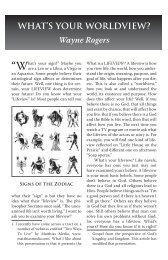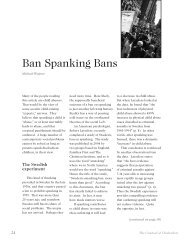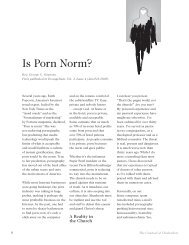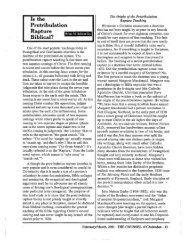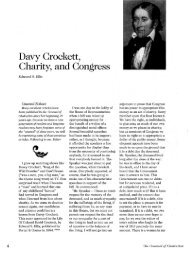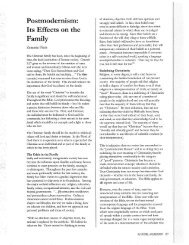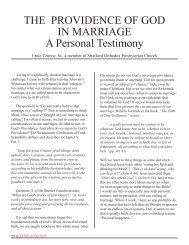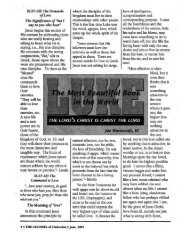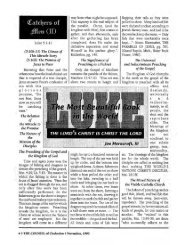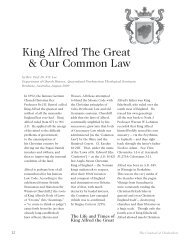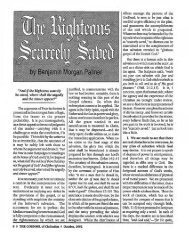Information Overload: The Search for Meaning in a Postmodern World
Information Overload: The Search for Meaning in a Postmodern World
Information Overload: The Search for Meaning in a Postmodern World
You also want an ePaper? Increase the reach of your titles
YUMPU automatically turns print PDFs into web optimized ePapers that Google loves.
<strong>In<strong>for</strong>mation</strong> <strong>Overload</strong>:<br />
<strong>The</strong> <strong>Search</strong><br />
<strong>for</strong> <strong>Mean<strong>in</strong>g</strong> <strong>in</strong> a<br />
<strong>Postmodern</strong> <strong>World</strong><br />
Mark D. Anthony, Sr.<br />
Tf7here is the Life IJJe hCllJe lost <strong>in</strong> liv<strong>in</strong>g?<br />
U::7here is the J}Jisdolll JJJe have lost <strong>in</strong> klloJJ;/edge?<br />
If::7here is the klloJ);/edge IJJe have lost il7 ili<strong>for</strong>lllatioll?<br />
- T.8. Eliot: Choruses from "<strong>The</strong> Rock"<br />
Do you have <strong>in</strong><strong>for</strong>mation overload? Would you<br />
know it if you saw it?<br />
In a famous study, French economist Georges<br />
Anderla broke humanity's knowledge <strong>in</strong>to units.<br />
He estimated that by AD 1500,<br />
humanity had amassed two units<br />
of knowledge. With<strong>in</strong> 250 years,<br />
totallmowledge had doubled; the<br />
next doubl<strong>in</strong>g took only 150 years,<br />
and the next, only 50 years. <strong>The</strong><br />
one after that took only ten years,<br />
so that by 1960 humanity had<br />
gathered 32 units of knowledge.<br />
<strong>The</strong> next doubl<strong>in</strong>gs took seven<br />
and then six years, tak<strong>in</strong>g us to<br />
128 units <strong>in</strong> 1973, the year of<br />
Anderla's study. S<strong>in</strong>ce then, the<br />
rate of doubl<strong>in</strong>g has cont<strong>in</strong>ued<br />
to <strong>in</strong>crease ever more rapidly so that today, with<br />
the advent of the <strong>in</strong><strong>for</strong>mation revolution, human<br />
Imowledge is estimated to be doubl<strong>in</strong>g every eighteen<br />
months and it is predicted that it will double every<br />
four months by the year 2010. 1<br />
Look<strong>in</strong>g at it another way, accord<strong>in</strong>g to the<br />
Frankl<strong>in</strong>Covey learn<strong>in</strong>g center 2 , <strong>in</strong> 1900, people were<br />
exposed to 1,000 new pieces of <strong>in</strong><strong>for</strong>mation every<br />
six months. By 1960, people were fac<strong>in</strong>g that same<br />
amount of <strong>in</strong><strong>for</strong>mation every week. Today, we are<br />
exposed to 1,000 new pieces of <strong>in</strong><strong>for</strong>mation every<br />
s<strong>in</strong>gle hour!<br />
26 the COUNSEL of CHALCEDON<br />
Yet, while data and <strong>in</strong><strong>for</strong>mation have grown<br />
exponentially as we have moved from an <strong>in</strong>dustrial<br />
to an <strong>in</strong><strong>for</strong>mation based society, our capacity <strong>for</strong><br />
assiJl1ilat<strong>in</strong>g it has rema<strong>in</strong>ed relatively static. So<br />
we f<strong>in</strong>d ourselves, accord<strong>in</strong>g to futurist John<br />
Naisbitt, "drown<strong>in</strong>g <strong>in</strong> <strong>in</strong><strong>for</strong>mation but starved <strong>for</strong><br />
knowledge.'" In other words, we live <strong>in</strong> a world<br />
drown<strong>in</strong>g <strong>in</strong> data, but starved <strong>for</strong> mean<strong>in</strong>g. It is a<br />
postmodern world.<br />
\\le use the term "postmodernism" to refer to the<br />
basic worldview that is currently replac<strong>in</strong>g modernism.<br />
Modernism, which began with the European<br />
enlightenment, replaced premodernism. <strong>The</strong>se three<br />
terms are used to divide human history <strong>in</strong>to three eras.<br />
N one of these three eras is represented by any s<strong>in</strong>gle<br />
worldview: But the numerous worldviews with<strong>in</strong><br />
each era all have a commonality that is represented by<br />
the terms premodern, modern, or postmodern.<br />
<strong>The</strong> premodern era, encompass<strong>in</strong>g the dawn<br />
of philosophy up through the enlightenment,<br />
<strong>in</strong>clud<strong>in</strong>g the renaissance and the<br />
re<strong>for</strong>mation, was characterized by<br />
belief <strong>in</strong> absolute trutlL. And that<br />
truth was known by revelation,<br />
whether or not the revelation<br />
was Christian <strong>in</strong> nature. Self was<br />
lmowable, but only <strong>in</strong> light of<br />
what God, or the gods or spirits,<br />
revealed. <strong>The</strong> premodern era was<br />
characterized by a strong belief <strong>in</strong><br />
the supernatural.<br />
<strong>The</strong> modern era also believed <strong>in</strong><br />
truth, but it no longer believed<br />
truth came from revelation.<br />
Modernists rejected the supernatural and God as<br />
be<strong>in</strong>g necessary to know truth or to Imow the good,<br />
though they did not stop express<strong>in</strong>g any belief <strong>in</strong> the<br />
supernatural. <strong>The</strong>y merely relegated it to a position<br />
of irrelevancy. Modernism believed <strong>in</strong> a knowable<br />
self that sees the world rationally. It elevated reason<br />
and empirical science to the heights of mean<strong>in</strong>g,<br />
lay<strong>in</strong>g all truth at their doorstep. If someth<strong>in</strong>g were<br />
scientifically and rationally true, then it was good, and<br />
vice versa. Objective science became the standard<br />
of truth. Language thus had to be rational as well.<br />
\\lords as symbols had to be concretely tied to that<br />
which tlLey signified. By the end of the Modern era,<br />
God was no longer merely transcendent, but had
een elim<strong>in</strong>ated from the scene altogether <strong>in</strong> many<br />
discipl<strong>in</strong>es.<br />
Neither premodernism nor modernism were absolute<br />
worldviews. Though they were the dom<strong>in</strong>ant views,<br />
<strong>in</strong> each era there were dissent<strong>in</strong>g views. Just as the<br />
roots of modernism were seen <strong>in</strong> the Renaissance, the<br />
roots of postmodernism were already on the scene<br />
dur<strong>in</strong>g the modern era. Romanticism had first rejected<br />
pure reason <strong>in</strong> the late 18 d , century and the order and<br />
absoluteness promised by modernism was under strong<br />
attack by the 19 th and early 20d> centuries. Artists and<br />
writers saw an unravel<strong>in</strong>g of order and fragmentation<br />
of objective reality. <strong>The</strong>se artists began to accept<br />
existentialism as their po<strong>in</strong>t of reference. In the words<br />
of a representative writer of this era, \'\7illiam Buder<br />
Yeats, "Th<strong>in</strong>gs fall apart; the centre cannot hold (<strong>in</strong><br />
his poem, <strong>The</strong> Second Com<strong>in</strong>iJ." <strong>The</strong>se artists were not<br />
yet postmodernists, because they did not celebrate<br />
this fall<strong>in</strong>g apart. Instead, they lamented it, th<strong>in</strong>k<strong>in</strong>g it<br />
their task as artists to provide mean<strong>in</strong>g<br />
where science and rationality had failed.<br />
<strong>The</strong>se artists were known variously<br />
as deconstructionists, romantlc1sts,<br />
modernists, and existentialists. Scientists<br />
were even question<strong>in</strong>g absolutes by now,<br />
beg<strong>in</strong>n<strong>in</strong>g to put <strong>for</strong>th theories of nature<br />
as be<strong>in</strong>g basically non-orderly.<br />
From these roots, later <strong>in</strong> the twentieth<br />
century, full blown postmodernism<br />
arrived sometime <strong>in</strong> the 70's and 80's.<br />
Unlike modernism, postmodernism does not postulate<br />
a knowable self. It does not see the world as rational<br />
or objective. It sees no truth beh<strong>in</strong>d the facts. Words,<br />
rather than signifiers of someth<strong>in</strong>g are just naked<br />
signifiers. <strong>Postmodern</strong>ism does not lament the loss<br />
of mean<strong>in</strong>g, nor does it look <strong>for</strong> mean<strong>in</strong>g <strong>in</strong> artistic<br />
endeavors. It <strong>in</strong>stead celebrates the mean<strong>in</strong>glessness,<br />
leav<strong>in</strong>g it up to <strong>in</strong>dividuals, groups, and cultures to def<strong>in</strong>e<br />
d1eir own reality rather than hav<strong>in</strong>g to submit to some<br />
objective reality. <strong>Postmodern</strong>ism is the idea that we are<br />
no longer supposed to ga<strong>in</strong> mean<strong>in</strong>g from the facts of<br />
the universe, or at least not the mean<strong>in</strong>g that culture has<br />
"canonized" <strong>for</strong> us. We must reject the mean<strong>in</strong>g that<br />
those with power have assigned to our experience and<br />
let each person f<strong>in</strong>d his own mean<strong>in</strong>g. We are no longer<br />
to br<strong>in</strong>g preconceptions to the table. Our only mean<strong>in</strong>g<br />
is to reject mean<strong>in</strong>g, our only presupposition to discard<br />
presuppositions. <strong>Postmodern</strong>ism deconstructs any and<br />
all constructions of worldview.<br />
Ili<strong>for</strong>matioll Ovedoad: <strong>The</strong> <strong>Search</strong> <strong>for</strong> Meallillg ill a Post modem Tf:7odd<br />
We live <strong>in</strong> a world<br />
drown<strong>in</strong>g <strong>in</strong> data,<br />
but starved <strong>for</strong><br />
mean<strong>in</strong>g.<br />
We are left, as Cornelius Van Til once said, attempt<strong>in</strong>g<br />
to str<strong>in</strong>g together beads with no holes on an <strong>in</strong>f<strong>in</strong>itely<br />
long str<strong>in</strong>g with no ends. We are left with raw data and<br />
<strong>in</strong><strong>for</strong>mation and no relevance or mean<strong>in</strong>g. In the words<br />
of Shakespeare's MacBeth:<br />
Out, Ottt, briif candle!<br />
Life's bllt a walk<strong>in</strong>g shado));, a poorplqyer<br />
That struts and frets his hour upon the stage<br />
And thm is heard no more: it is a tale<br />
Told l?Y an idiot, fitl! of sound and fury,<br />
S ignijj<strong>in</strong>g noth<strong>in</strong>g.<br />
One day, when the gospel covers the earth as the waters<br />
cover the sea, the dom<strong>in</strong>ant worldview will be the Bible.<br />
Until then, it is important to identify at any given time<br />
the world system <strong>in</strong> which we live so that we are able to<br />
avoid lov<strong>in</strong>g the th<strong>in</strong>gs that are <strong>in</strong> the world and <strong>in</strong> order<br />
that we can sh<strong>in</strong>e the light of Christ <strong>in</strong>to the darkness.<br />
Though we are not postmodernists, we are left with<br />
the fact that we live <strong>in</strong> a postmodern<br />
age, just as faithful Christians who were<br />
not modernists lived <strong>in</strong> the modern age.<br />
While there are still strong elements<br />
of modernism <strong>in</strong> the world, we have<br />
entered <strong>in</strong>to a new era. Modernism has<br />
passed as the dom<strong>in</strong>ant view.<br />
Thus we live <strong>in</strong> a world that has learned<br />
to deal with <strong>in</strong>fo-glut by rel<strong>in</strong>quish<strong>in</strong>g<br />
all claims to mean<strong>in</strong>g. But the loss of<br />
mean<strong>in</strong>g is not merely the result of<br />
the proliferation of <strong>in</strong><strong>for</strong>mation. It also relates to<br />
fragmentation of community, a driv<strong>in</strong>g autonomy and<br />
<strong>in</strong>dividualism <strong>in</strong> all areas of endeavor, and rejection of<br />
God and all <strong>for</strong>ms of authority, especially <strong>in</strong> relation to<br />
def<strong>in</strong><strong>in</strong>g truth.<br />
<strong>The</strong> fragmentation of community is occurr<strong>in</strong>g through<br />
<strong>in</strong>creased urbanization and mobility. As people move<br />
from job to job and city to city, they lose their community<br />
context. In one sense, it is community which gives data<br />
and <strong>in</strong><strong>for</strong>mation ultimate mean<strong>in</strong>g. R.J. Boland writes,<br />
" ... perfect <strong>in</strong><strong>for</strong>mation does not exist as an object, and<br />
<strong>in</strong>telligence does not exist, except as it is embodied<br />
<strong>in</strong> a human be<strong>in</strong>g. <strong>In<strong>for</strong>mation</strong> is not a resource to<br />
be stockpiled as one more factor of production. It is<br />
mean<strong>in</strong>g and can only be achieved through dialogue <strong>in</strong><br />
a human community. <strong>In<strong>for</strong>mation</strong> is not a commodity.<br />
It is a skilled human accomplishment."4<br />
the COUNSEL of CHALCEDON 27
Rampant <strong>in</strong>dividualism <strong>in</strong> all areas of human endeavor<br />
can hardly be refuted. It is evident <strong>in</strong> art and literature of<br />
every genre. Man desires to be autonomous <strong>in</strong> def<strong>in</strong><strong>in</strong>g<br />
himself and that which is required of him <strong>in</strong> life.<br />
Ultimately, though, the loss of mean<strong>in</strong>g is boiled down<br />
to one th<strong>in</strong>g only, a rejection of mean<strong>in</strong>g - a rejection,<br />
ultimately, of God. Man has attempted, autonomously,<br />
to create his own mean<strong>in</strong>g, arriv<strong>in</strong>g f<strong>in</strong>ally at the<br />
paradoxical conclusion that mean<strong>in</strong>glessness is the<br />
highest mean<strong>in</strong>g. This is the <strong>in</strong>evitable outcome of<br />
Godless th<strong>in</strong>k<strong>in</strong>g. Van Til expla<strong>in</strong>s it best:<br />
... <strong>The</strong>re are two ways of defend<strong>in</strong>g the faith. One<br />
of these beg<strong>in</strong>s from man as self-sufficient and<br />
works up to God, while the other beg<strong>in</strong>s from<br />
the triune God of the scriptures and relates all<br />
th<strong>in</strong>gs to him. . .. <strong>The</strong> traditional ideas of try<strong>in</strong>g to<br />
f<strong>in</strong>d some neutral, common ground on which the<br />
believer and unbeliever can stand are based on the<br />
notion that man is autonomous... [yet] Paul says,<br />
all men, know<strong>in</strong>g God, hold down this knowledge<br />
<strong>in</strong> unrighteousness .... [This knowledge] is the only<br />
basis man has on which he can stand, to know<br />
himself, to f<strong>in</strong>d the facts of his world and learn<br />
how to relate them to one another. Without the<br />
Creator-God-Redeemer of Scripture the universe<br />
would resemble an <strong>in</strong>f<strong>in</strong>ite number of beads with<br />
no holes <strong>in</strong> any of them, yet which must all be<br />
strung by an <strong>in</strong>f<strong>in</strong>itely long str<strong>in</strong>g.<br />
As consumer market<strong>in</strong>g reaches new heights of<br />
identify<strong>in</strong>g and market<strong>in</strong>g to smaller and smaller groups,<br />
even to the <strong>in</strong>dividual through targeted postal and<br />
electronic mail, the postmodern culture of the current<br />
world system offers us an ever <strong>in</strong>creas<strong>in</strong>g menu of<br />
choices <strong>in</strong> media, <strong>in</strong><strong>for</strong>mation, activities, and decisions.<br />
Rather than be<strong>in</strong>g the "spice of life," the sheer volume<br />
of variety brought to us by various media becomes<br />
noise. It is a m<strong>in</strong>d-numb<strong>in</strong>g variety, a broth of millions<br />
of bits of data laced with bright and loud messages.<br />
We are awash <strong>in</strong> the proliferation of television channels,<br />
movies, telephone calls, emails, books, magaz<strong>in</strong>es,<br />
newspapers, advertisements, cell phone calls, voice mail<br />
messages, letters, <strong>in</strong>ternet news, <strong>in</strong>ternet discussion<br />
groups, <strong>in</strong>ternet chat, real <strong>in</strong>terpersonal relationships,<br />
radio, etc. And <strong>in</strong><strong>for</strong>mation is not just media related. It<br />
also comes to us <strong>in</strong> the <strong>for</strong>m of friendships, activities,<br />
and memberships. Anyth<strong>in</strong>g <strong>for</strong> which we have to make<br />
room <strong>in</strong> our m<strong>in</strong>ds is <strong>in</strong><strong>for</strong>mation. When we have to<br />
juggle soccer practice with youth group and the grocery<br />
shopp<strong>in</strong>g, we're still deal<strong>in</strong>g with <strong>in</strong><strong>for</strong>mation. People<br />
28 (he COUNSEL of CHALCEDON<br />
In<strong>for</strong>ll/atioll <strong>Overload</strong>: Tbe S eal'cb <strong>for</strong> J'vIeallilig ill a Pastil/adem Tf70rld<br />
cont<strong>in</strong>ually pour <strong>in</strong><strong>for</strong>mation on each other, without<br />
us<strong>in</strong>g good judgment, compound<strong>in</strong>g the overload.<br />
So we f<strong>in</strong>d ourselves liv<strong>in</strong>g <strong>in</strong> an ever more noisy world<br />
where we are be<strong>in</strong>g driven apart from each other and<br />
asked to deal with the <strong>in</strong>creas<strong>in</strong>g torrent of <strong>in</strong><strong>for</strong>mation<br />
and activity <strong>in</strong> our lives as <strong>in</strong>dividuals separated from<br />
community and from mean<strong>in</strong>g itself. Those who do<br />
not have Christ will not survive. <strong>The</strong>y will succumb to<br />
the mean<strong>in</strong>glessness, perhaps even revel <strong>in</strong> it, as they go<br />
on suppress<strong>in</strong>g the truth <strong>in</strong> unrighteousness. But what<br />
of Christians? How are they to live <strong>in</strong> this postmodern<br />
world without be<strong>in</strong>g postmodernists? In a postmodern<br />
world, Christians <strong>in</strong> the 21 st century can have one of<br />
several responses:<br />
• Slfrrender - <strong>The</strong>y can surrender, drown<strong>in</strong>g <strong>in</strong> the<br />
<strong>in</strong><strong>for</strong>mation, allow<strong>in</strong>g it to be a distraction, robber,<br />
and stress accumulator <strong>in</strong> their lives.<br />
• Addictioll and Cover Up - Some of those who<br />
surrender to <strong>in</strong><strong>for</strong>mation overload also use it<br />
as a shield beh<strong>in</strong>d which they either vegetate or<br />
create one or many false personas as they <strong>in</strong>teract<br />
with the virtual world. This can be as benign as<br />
participation <strong>in</strong> onl<strong>in</strong>e <strong>for</strong>ums where they suddenly<br />
become theological experts, or as malignant as<br />
immersion <strong>in</strong> the onl<strong>in</strong>e pornography culture.<br />
• TFithdrt/J}Ja!- <strong>The</strong>y can withdraw from technology,<br />
throw<strong>in</strong>g their televisions out the door and<br />
disconnect<strong>in</strong>g their <strong>in</strong>ternet service.<br />
• Dom<strong>in</strong>ion - Or they can take dom<strong>in</strong>ion over<br />
<strong>in</strong><strong>for</strong>mation, as God has commanded.<br />
Stlrrender is the most common response, and many<br />
of those who surrender are not even aware of it.<br />
<strong>The</strong>ir lives are ruled by <strong>in</strong>terruptions. <strong>The</strong>y are like<br />
p<strong>in</strong>balls bounc<strong>in</strong>g off bumpers, react<strong>in</strong>g rather than<br />
liv<strong>in</strong>g. Those who have surrendered are ruled by their<br />
schedules and <strong>in</strong><strong>for</strong>mation sources. <strong>The</strong>y run around<br />
willy nilly, try<strong>in</strong>g to get the kids and themselves to all the<br />
right places at the right times. <strong>The</strong>y ask you to please<br />
wait a m<strong>in</strong>ute while they answer their cell phones; they<br />
use call wait<strong>in</strong>g to switch between callers while leav<strong>in</strong>g<br />
you on hold; and they check their email and voice<br />
mail <strong>in</strong>cessantly. Often, wealth and affluence amplify<br />
the problem, offer<strong>in</strong>g an even wider menu of choices<br />
<strong>in</strong> media and add<strong>in</strong>g the tyranny of "stuffitis" to the<br />
picture. <strong>The</strong> challenges of too much <strong>in</strong><strong>for</strong>mation and
activity are replaced by the "right" <strong>in</strong><strong>for</strong>mation and the<br />
"right" activities and hav<strong>in</strong>g the "right" stuff.<br />
<strong>The</strong> chaos of surrenderers may be visible to all, or it<br />
may be well hidden. <strong>The</strong>y may give the appearance<br />
of be<strong>in</strong>g very organized with all their tools. <strong>The</strong>y may<br />
even really be very organized externally, hav<strong>in</strong>g the<br />
appearance of govern<strong>in</strong>g the <strong>in</strong><strong>for</strong>mation and activities<br />
<strong>in</strong> their lives. However, the truth is that their lives aren't<br />
with<strong>in</strong> their own control. <strong>The</strong>y are slaves to rather than<br />
masters of their time and <strong>in</strong><strong>for</strong>mation commitments.<br />
<strong>The</strong>y are act<strong>in</strong>g autonomously rather than accord<strong>in</strong>g<br />
to God's word. Rather than relat<strong>in</strong>g everyth<strong>in</strong>g <strong>in</strong><br />
their lives to God and His word as a central anchor<br />
po<strong>in</strong>t, they merely try to relate God to each <strong>in</strong>dividual<br />
endeavor <strong>in</strong> their lives. Thus they live fragmented and<br />
compartmentalized lives. Quent<strong>in</strong> Schultze, professor<br />
of communications arts and sciences at Calv<strong>in</strong> College,<br />
po<strong>in</strong>ts out, quot<strong>in</strong>g Vaclav Havel, "'with the loss of<br />
God, man has lost a k<strong>in</strong>d of absolute and universal<br />
system of coord<strong>in</strong>ates, to which he could<br />
always relate anyth<strong>in</strong>g, chiefly himself.'<br />
As a result we live 'as if we were play<strong>in</strong>g<br />
<strong>for</strong> a number of different teams at once,<br />
each with different uni<strong>for</strong>ms, and as<br />
though ... we didn't know which one we<br />
ultimately belonged to, which of those<br />
teams was really ours."s <strong>The</strong>se people,<br />
whether they seem externally chaotic or<br />
organized, are fragmented <strong>in</strong>side, not<br />
understand<strong>in</strong>g how to relate the totality<br />
of their lives to a s<strong>in</strong>gle mean<strong>in</strong>g and<br />
purpose, how to br<strong>in</strong>g their lives <strong>in</strong>to subjection to God<br />
through His word.<br />
Addiction and cover tip are often the ultimate dest<strong>in</strong>ation<br />
of the surrenderers. <strong>The</strong>se people get "hooked" on<br />
cyberspace. <strong>The</strong>y use it either as a tranquilizer or as<br />
a stimulant, spend<strong>in</strong>g large amounts of time either<br />
vegg<strong>in</strong>g out on m<strong>in</strong>dless games and endless gossip<br />
and news b<strong>in</strong>ges, participat<strong>in</strong>g <strong>in</strong> one or more onl<strong>in</strong>e<br />
communities via chat and discussion <strong>for</strong>ums, or<br />
"creat<strong>in</strong>g" and communicat<strong>in</strong>g themselves via onl<strong>in</strong>e<br />
diaries known as blogs (from web logs). <strong>The</strong>y either<br />
rel<strong>in</strong>quish liv<strong>in</strong>g at all <strong>in</strong> the vegetative response, or live<br />
one or more <strong>in</strong>authentic lives via the anonymous web.<br />
Schultze, aga<strong>in</strong> quot<strong>in</strong>g Havel, says "We 'merge with<br />
the anonymous crowd' and 'flow com<strong>for</strong>tably along<br />
with it down the river of pseudo-life. This is more than<br />
a simple conflict between two identities,' concludes<br />
Havel. 'It is someth<strong>in</strong>g far worse: it is a challenge to<br />
l!i<strong>for</strong>llJatioli <strong>Overload</strong>: <strong>The</strong> <strong>Search</strong> jodVIeallillg ill a Postmodem 1170rld<br />
Dom<strong>in</strong>ion is the<br />
only appropriate<br />
Christian response<br />
to the postmodern<br />
world ...<br />
the very notion of identity itself.' Cyberspace is one<br />
'place' where people can create so many contradictory<br />
self-identities that they no longer have coherent self<br />
and there<strong>for</strong>e no possibility <strong>for</strong> authenticity."6<br />
U7ithdral)!al is the tactic of those Christians who<br />
recognize the danger of surrender and addiction/ cover<br />
up and choose <strong>in</strong>stead to retreat altogether. <strong>The</strong>y exist<br />
somewhere along the cont<strong>in</strong>uum between refusal to own<br />
or subscribe to any <strong>for</strong>m of media and abst<strong>in</strong>ence from<br />
consum<strong>in</strong>g any "secular" media. <strong>The</strong>y either throw<br />
their televisions out the door, or they only watch the 700<br />
club, TBN, and Angel Network programm<strong>in</strong>g. <strong>The</strong>y<br />
leave their radios off, listen<strong>in</strong>g <strong>in</strong>stead to only Christian<br />
tapes and CD's, or they listen exclusively to "Christian"<br />
radio. <strong>The</strong>y often don't even read newspapers or<br />
magaz<strong>in</strong>es. <strong>The</strong>se Christians take the "touch not, taste<br />
not" approach to media and <strong>in</strong><strong>for</strong>mation management.<br />
At first glance, it would appear that this group has the<br />
problem licked. <strong>The</strong>y are no longer suffer<strong>in</strong>g from<br />
<strong>in</strong><strong>for</strong>mation overload and lett<strong>in</strong>g media<br />
and <strong>in</strong><strong>for</strong>mation rule them. But is this<br />
true? First, we must look to all their<br />
other activities. Have they elim<strong>in</strong>ated<br />
their phones? Have they elim<strong>in</strong>ated and<br />
brought under control their participation<br />
<strong>in</strong> the proliferation of various activities?<br />
Often, they are just as busy, harried,<br />
and hurried as everyone else. <strong>The</strong>y are<br />
merely a new flavor of <strong>in</strong><strong>for</strong>mation and<br />
activity slave. Some of them, though,<br />
have truly brought all their activities <strong>in</strong>to<br />
balance and under control and are liv<strong>in</strong>g simple lives.<br />
Even then, they have not yet fully realized God's <strong>in</strong>tent<br />
<strong>for</strong> how we are to live <strong>in</strong> a cyber-culture that grows ever<br />
more pervasive. Retreat is limited dom<strong>in</strong>ion. God<br />
requires of us a dom<strong>in</strong>ion that presses the claims of<br />
Christ <strong>in</strong>to all of culture. If we withdraw, how will we<br />
be salt and light?<br />
DOll/illiOIl is the only appropriate Christian response to<br />
the postmodern world, just as it has always been the<br />
only appropriate response <strong>in</strong> every age. Christians are<br />
given by God the work of dom<strong>in</strong>ion. This is recognized<br />
by some <strong>in</strong> the modern evangelical church as the<br />
"Dom<strong>in</strong>ion mandate," and by others as the "Cultural<br />
Mandate." But any attempt to br<strong>in</strong>g dom<strong>in</strong>ion and<br />
order to our culture and world must beg<strong>in</strong> first and<br />
<strong>for</strong>emost with issues of self-discipl<strong>in</strong>e. In other words,<br />
whatever we do to take dom<strong>in</strong>ion over <strong>in</strong><strong>for</strong>mation and<br />
activities must <strong>in</strong>volve self-control and changed habits.<br />
the COUNSEL ofCHALCEDON 29
---."-<br />
Tak<strong>in</strong>g dom<strong>in</strong>ion over <strong>in</strong><strong>for</strong>mation overload is not a<br />
science, and so I will not pretend to offer a <strong>for</strong>mula<br />
here <strong>for</strong> do<strong>in</strong>g so. Rather, I am attempt<strong>in</strong>g to offer<br />
a strategy, a Biblical pr<strong>in</strong>cipal, <strong>for</strong> approach<strong>in</strong>g the<br />
problem. While I will refer to some practical ideas here,<br />
I will hold off on discuss<strong>in</strong>g most practical tactics. I will<br />
address these <strong>in</strong> future articles where I will write about<br />
tak<strong>in</strong>g dom<strong>in</strong>ion and f<strong>in</strong>d<strong>in</strong>g mean<strong>in</strong>g <strong>in</strong> postmodern<br />
culture <strong>in</strong> specific ways, from time management to<br />
technology management.<br />
In order to take dom<strong>in</strong>ion, we must do exactly what<br />
the postmodernist abhors and rejects. We must assign<br />
mean<strong>in</strong>g to <strong>in</strong><strong>for</strong>mation and to our existence. We are<br />
the only group which has true mean<strong>in</strong>g at our disposal.<br />
God has revealed Himself and the mean<strong>in</strong>g that He gives<br />
the world to His people. In fact, we must proclaim and<br />
extend that mean<strong>in</strong>g to the world, <strong>in</strong>fluenc<strong>in</strong>g, shap<strong>in</strong>g<br />
and build<strong>in</strong>g culture. In a world where mean<strong>in</strong>g has<br />
been abandoned, the Gospel must sh<strong>in</strong>e <strong>for</strong>th. This<br />
is our God given duty. And aga<strong>in</strong>, this process starts<br />
with each <strong>in</strong>dividual and proceeds <strong>for</strong>th <strong>in</strong>to the world<br />
through the <strong>in</strong>dividual's family, church, and vocation,<br />
permeat<strong>in</strong>g their community, state, nation, and world.<br />
Thus we see the growth of the Biblical worldview<br />
only through the changed lives of Christians. As more<br />
and more lives are changed, gradually culture itself is<br />
changed and rebuilt. We can only conquer the world<br />
as the Gospel of Christ conquers <strong>in</strong>dividual hearts,<br />
grow<strong>in</strong>g the Church, press<strong>in</strong>g the claims of Christ<br />
upon all creation.<br />
Christians, as they submit themselves to the word, will<br />
br<strong>in</strong>g order to each of these areas of <strong>in</strong>fluence, <strong>in</strong> this<br />
order. <strong>The</strong>y will first govern themselves, then their<br />
families, and then their vocations and churches, build<strong>in</strong>g<br />
culture as they go. Eventually, when there are enough<br />
self governed people govern<strong>in</strong>g enough political,<br />
vocational, philosophical, and aesthetic communities;<br />
then states, nations, and the world will be <strong>in</strong>fluenced.<br />
In order to beg<strong>in</strong> obey<strong>in</strong>g God's dom<strong>in</strong>ion mandate, we<br />
must start with ourselves. We must br<strong>in</strong>g ourselves <strong>in</strong><br />
subjection to the word of God and live by His law. And<br />
we can only do this as we take advantage of the means<br />
of grace He has provided <strong>for</strong> us. One of the first<br />
th<strong>in</strong>gs we must do is be sure we are not act<strong>in</strong>g <strong>in</strong> the<br />
world as <strong>in</strong>dividuals. We must not <strong>for</strong>sake the gather<strong>in</strong>g<br />
together of ourselves <strong>in</strong> corporate worship. We must<br />
live with<strong>in</strong> the context of God's covenant people, His<br />
visible church. It is there that we f<strong>in</strong>d the community<br />
30 (he COUNSEL of CHALCEDON<br />
<strong>In<strong>for</strong>mation</strong> <strong>Overload</strong>: <strong>The</strong> <strong>Search</strong> <strong>for</strong> <strong>Mean<strong>in</strong>g</strong> ill a PostlJlodem Tf:7orld<br />
with<strong>in</strong> which to contextualize <strong>in</strong><strong>for</strong>mation. And it is<br />
there - as we participate <strong>in</strong> the means of grace, sitt<strong>in</strong>g<br />
under the faithful preach<strong>in</strong>g of the word and partak<strong>in</strong>g<br />
of the sacraments rightly adm<strong>in</strong>istered - that we ga<strong>in</strong><br />
the only mean<strong>in</strong>g that can br<strong>in</strong>g order to chaos.<br />
Rather than look<strong>in</strong>g <strong>for</strong> mean<strong>in</strong>g <strong>in</strong> the floods of<br />
<strong>in</strong><strong>for</strong>mation that confront us, we f<strong>in</strong>d mean<strong>in</strong>g <strong>in</strong> the<br />
community of believers, <strong>in</strong> God's word, and <strong>in</strong> God<br />
Himself. Rather than try<strong>in</strong>g to figure out how to relate<br />
God to all the divergent activities and <strong>in</strong>terests <strong>in</strong> our<br />
lives, we beg<strong>in</strong> to relate our lives to God. We start with<br />
mean<strong>in</strong>g first, rather than <strong>in</strong><strong>for</strong>mation and activity, and<br />
we suddenly f<strong>in</strong>d that, through the renew<strong>in</strong>g of our<br />
m<strong>in</strong>ds <strong>in</strong> Christ, we beg<strong>in</strong> to make sense of the world<br />
and its <strong>in</strong><strong>for</strong>mation. We no longer search <strong>for</strong> mean<strong>in</strong>g<br />
<strong>in</strong> the <strong>in</strong><strong>for</strong>mation and activities. As God's covenant<br />
people, mean<strong>in</strong>g has found us. We merely have to<br />
embrace that mean<strong>in</strong>g and relate all the other facts of<br />
the world to it. "Ultimately all the facts of the universe<br />
are either what they are because of their relation to the<br />
system of truth set <strong>for</strong>th <strong>in</strong> Scripture or they are not.<br />
In every discussion about every fact, there<strong>for</strong>e, it is the<br />
two pr<strong>in</strong>ciples, that of the believer <strong>in</strong> Scripture and<br />
that of the non-Christian, that stand over aga<strong>in</strong>st one<br />
another," writes Van Til.7 Or, as Abraham Kuyper put<br />
it, "there is not one square <strong>in</strong>ch of the entire creation<br />
about which Jesus Christ does not cry out, 'This is m<strong>in</strong>e,<br />
this belongs to me."'8 Because the earth is the Lord's,<br />
and the fullness thereof, there<strong>for</strong>e all the facts that exist<br />
are created by and redeemed by Christ, from whom, to<br />
whom, and through whom are all th<strong>in</strong>gs.<br />
Be<strong>in</strong>g confronted and subdued by true mean<strong>in</strong>g <strong>in</strong><br />
Christ, we f<strong>in</strong>d, as John Calv<strong>in</strong> wrote, "Nearly all the<br />
wisdom we possess, that is to say, true and sound<br />
wisdom, consists of two parts: the lmowledge of God<br />
and of ourselves."9 In our quest to take dom<strong>in</strong>ion<br />
over <strong>in</strong><strong>for</strong>mation, we must beg<strong>in</strong> with knowledge of<br />
God, but be<strong>for</strong>e we venture <strong>for</strong>th, there is additional<br />
understand<strong>in</strong>g we must acquire. Not only must we<br />
understand God and His revelation about Himself, we<br />
must also understand His revelation about ourselves. We<br />
must understand who, accord<strong>in</strong>g to God, man is - who<br />
we are. In this context, we learn about our s<strong>in</strong>fulness<br />
and the s<strong>in</strong>-pr<strong>in</strong>cipal aga<strong>in</strong>st which all Christians do<br />
battle. We also learn that we are created to work, to<br />
have a vocational call<strong>in</strong>g <strong>in</strong> Christ. We must know<br />
what God has placed us on earth to be and what He<br />
has placed us on earth to do be<strong>for</strong>e we can understand<br />
what activity and <strong>in</strong><strong>for</strong>mation is appropriate. Only then
can we beg<strong>in</strong> to elim<strong>in</strong>ate clutter from our agendas and<br />
<strong>in</strong>fo-glut from our rout<strong>in</strong>es. We do this by apply<strong>in</strong>g<br />
God's word, His law-word, to every area of life.<br />
In order to understand ourselves by God's standard, we<br />
must beg<strong>in</strong> with humility. True knowledge of ourselves<br />
- true mean<strong>in</strong>g about ourselves - demands this. Once<br />
we have been subdued by true mean<strong>in</strong>g <strong>in</strong> and about<br />
Christ, we see ourselves as s<strong>in</strong>ners. We come to we<br />
realize that, even on that day of our lives when we've<br />
lived as righteously as we will ever live on this earth, our<br />
righteousness is still like filthy rags compared with the<br />
righteousness of Christ. Even on that very best day we<br />
will ever live, we still need the righteousness of Christ<br />
<strong>in</strong> order to be accepted by God, s<strong>in</strong>ce only perfect<br />
righteousness will satisfy Him. In fact, we realize that<br />
even on that most righteous day of our lives, the only<br />
th<strong>in</strong>g good about what we've done is still beyond our<br />
do<strong>in</strong>g. It derives its goodness from God's grace and not<br />
our actions. Clothed with the proper humility, we will<br />
go <strong>for</strong>th carefully, understand<strong>in</strong>g that<br />
we are fallible, that we cannot assume<br />
to play with fire without gett<strong>in</strong>g burned.<br />
We will guard our hearts.<br />
Not only must we depend on Christ's<br />
righteousness to br<strong>in</strong>g any good <strong>in</strong>to<br />
our lives, but we must realize that He<br />
has purchased our very lives. He lived<br />
the righteous life we could not, and He<br />
also died on the cross to propitiate the<br />
wrath of God aga<strong>in</strong>st our s<strong>in</strong>. Thus He<br />
purchased us <strong>for</strong> His own possession. We are not our<br />
own. As a result, we are not to go <strong>for</strong>th <strong>in</strong>to the world<br />
seek<strong>in</strong>g to do that which pleases us. We must <strong>in</strong>stead<br />
learn God's vocational call<strong>in</strong>g <strong>for</strong> our lives, what it is<br />
that God has created us to do. We all share common<br />
vocations. While young, we may rely on the fact that<br />
we are called by God to be children and students.<br />
Women are called to be help-meets, mothers, and home<br />
executives. Men are called to be husbands, providers,<br />
shepherds, and fathers. But beyond our common<br />
vocations, we receive by God's providence our specific<br />
vocations. We may be preachers, teachers, lawyers,<br />
bus drivers, or bus<strong>in</strong>ess owners. At each stage of our<br />
lives, we must apply our dom<strong>in</strong>ion over <strong>in</strong><strong>for</strong>mation<br />
<strong>in</strong> the context of these call<strong>in</strong>gs. If we do not know<br />
who we are <strong>in</strong> Christ and what he has called us to do<br />
<strong>in</strong> this world <strong>in</strong> our common and specific vocations, we<br />
will <strong>for</strong>ever be plagued by <strong>in</strong>decision and <strong>in</strong><strong>for</strong>mation<br />
overload, often be<strong>in</strong>g led to "paralysis by analysis."<br />
Ill<strong>for</strong>matioll <strong>Overload</strong>: <strong>The</strong> <strong>Search</strong> <strong>for</strong> Meall<strong>in</strong>g <strong>in</strong> a Post modem H70rld<br />
... "our lives become<br />
database productions<br />
that deliver<br />
whatever <strong>in</strong><strong>for</strong>mation<br />
is called <strong>for</strong> <strong>in</strong> a<br />
given context./I<br />
If we have started with humility, we easily conclude,<br />
as we must, that we cannot not know everyth<strong>in</strong>g. We<br />
cannot consume all <strong>in</strong><strong>for</strong>mation. Google, the most<br />
popular search site on the <strong>in</strong>ternet at the time of this<br />
writ<strong>in</strong>g, currently <strong>in</strong>dexes just over three billion web<br />
pages. How much time would it take to even count<br />
to three billion, much less to read the <strong>in</strong><strong>for</strong>mation on<br />
three billion pages or attempt to assimilate it? No, if we<br />
have ga<strong>in</strong>ed a right knowledge of ourselves, we will not<br />
feel that we need to nor <strong>in</strong>deed can know everyth<strong>in</strong>g, or<br />
even a very small portion of everyth<strong>in</strong>g.<br />
All we really need to know is how to go about locat<strong>in</strong>g<br />
knowledge when and if we need to know it rather<br />
than attempt<strong>in</strong>g to accumulate all the <strong>in</strong><strong>for</strong>mation that<br />
comes our way. At that po<strong>in</strong>t when we actually need the<br />
<strong>in</strong><strong>for</strong>mation, then we can go to the <strong>in</strong>ternet, or a real<br />
live expert, and f<strong>in</strong>d it. We can f<strong>in</strong>d out as much of it as<br />
we actually need <strong>for</strong> the moment. We can remember it<br />
<strong>for</strong> as long as we need to <strong>for</strong> the present need, and then<br />
promptly <strong>for</strong>get it if we won't need the<br />
knowledge <strong>in</strong> the future. But we won't<br />
be able to beg<strong>in</strong> mak<strong>in</strong>g decisions about<br />
what we need to know until we have<br />
learned who we are <strong>in</strong> Christ and what is<br />
His call<strong>in</strong>g is <strong>for</strong> our lives. When we are<br />
operat<strong>in</strong>g with<strong>in</strong> that call<strong>in</strong>g, with m<strong>in</strong>ds<br />
renewed by our read<strong>in</strong>g His word and<br />
hear<strong>in</strong>g it faithfully preached, then we<br />
can see what <strong>in</strong><strong>for</strong>mation is important<br />
to us and what is not.<br />
In order to take dom<strong>in</strong>ion over ourselves and thus over<br />
our <strong>in</strong>teraction with <strong>in</strong><strong>for</strong>mation and activities, we must<br />
apply the standard of God's perfect law to our lives and<br />
our <strong>in</strong>teractions. We must br<strong>in</strong>g all the commandments<br />
to bear on the problem. So, as we <strong>in</strong>teract with the flow<br />
of data and activities <strong>in</strong> our lives, we cannot surrender or<br />
let it consume us <strong>for</strong> then we have made unto ourselves<br />
gods, and the law tells us we must have no other god<br />
but God. If we devote too much of ourselves and our<br />
time to the flow of data, then data has become our idol.<br />
We must also not become addicted to the noise, or use<br />
it to cover up our attempts to become all th<strong>in</strong>gs to all<br />
people, shapeshifters recreat<strong>in</strong>g ourselves at whim. As<br />
Schultze writes, when we do this, "our lives become<br />
database productions that deliver whatever <strong>in</strong><strong>for</strong>mation<br />
is called <strong>for</strong> <strong>in</strong> a given context." Instead God's law<br />
requires us to, as Schultze po<strong>in</strong>ts out, "know who we<br />
are, to present that known self to others, and to avoid<br />
persona-build<strong>in</strong>g activities."l0 Why? Because to do<br />
the COUNSEL ofCHALCEDON 31
otherwise is to bear false witness as well as to make<br />
ourselves over <strong>in</strong> our own image, rather than <strong>in</strong> God's<br />
image, thus violat<strong>in</strong>g the first commandment as well as<br />
the second. We must limit our <strong>in</strong>put to that which is<br />
s<strong>in</strong>cere and to those th<strong>in</strong>gs that are useful to our call<strong>in</strong>g<br />
and roles <strong>in</strong> life. We must not commit adultery via sterile<br />
means such as the <strong>in</strong>ternet and we must not covet as the<br />
result of advertis<strong>in</strong>g and other media images.<br />
If the law of God is be<strong>in</strong>g applied, then what, <strong>in</strong> a more<br />
descriptive sense, does a life of God given mean<strong>in</strong>g<br />
look like <strong>in</strong> the postmodern cyber culture?<br />
In a word, it looks quiet.<br />
As God exhorts us <strong>in</strong> Psalm 46:10, Be still, and kllOIJJ that I<br />
am God: I Ivill be exalted among the heathet7, I Ivill be exalted <strong>in</strong><br />
the earth. <strong>The</strong> still or quiet life is a life of rest, grounded<br />
<strong>in</strong> God's sovereignty. God rested and is rest<strong>in</strong>g because<br />
He created perfectly. As Rushdoony wrote, "not a hair<br />
nor an atom can go astray or afield <strong>in</strong> His predest<strong>in</strong>ed<br />
work of creation, redemption, and re-creation. God's<br />
rest is thus an expression of His sovereignty and of the<br />
absoluteness of His government. Man cannot govern<br />
absolutely any aspect of his life or world, but he can<br />
rest <strong>in</strong> the fact that his God and Savior does govern<br />
absolutely and rests <strong>in</strong> His government. Only widl such<br />
a faith and with such a God can man rest."l1<br />
Thus, God tells us <strong>in</strong> Psalm 107:25-30:<br />
For He spoke and raised /tp a stom!) IJJil1tl, U7hich lifted<br />
ttp the }vaves of the sea. ThV' rose tip to the heavens,<br />
thry }vent dOlJJn to the depths; <strong>The</strong>ir sottllllelted aJJJqJ <strong>in</strong><br />
their misery. Thry reeled and staggered like a dmnkeJl<br />
man, And Ivere at their IVits' end. <strong>The</strong>n thry cried to the<br />
LORD <strong>in</strong> their trouble, And He brought thelJl Otlt of<br />
their distresses. He cat/sed the storm to be still, So that the<br />
)vaves of the sea }vere hushed. <strong>The</strong>n thry }JJere glad became<br />
thry )vere qtliet; So He gNided them to their desired havetl.<br />
As one beg<strong>in</strong>s to attempt to quiet his life, he sees that<br />
God has <strong>in</strong>deed, as He declares <strong>in</strong> Ecclesiastes 3:1,<br />
appo<strong>in</strong>ted a time <strong>for</strong> everyth<strong>in</strong>g, <strong>in</strong>clud<strong>in</strong>g A time to<br />
be silent, and a time to speak (Bccl. 3:7b). Kev<strong>in</strong> l'vIiller<br />
writes, "it is important to recognize that <strong>in</strong><strong>for</strong>mation<br />
must not only be managed, but also dethroned."12 In<br />
dethron<strong>in</strong>g <strong>in</strong><strong>for</strong>mation, we can employ many tactics<br />
while simultaneously restor<strong>in</strong>g important discipl<strong>in</strong>es to<br />
our lives.<br />
3 2 the COUNSEL of CHALCEDON<br />
llIjomJation <strong>Overload</strong>: <strong>The</strong> <strong>Search</strong> jorlvIeall<strong>in</strong>g ill a PostJJlodem lf70rld<br />
<strong>The</strong> quiet life isn't obta<strong>in</strong>ed by back<strong>in</strong>g off, or lett<strong>in</strong>g go.<br />
It isn't a passive quietness, but an active quietness. It is<br />
obta<strong>in</strong>ed by work <strong>The</strong> quiet life is contemplative. It<br />
is a life of reflection and prayer. It is a life of th<strong>in</strong>k<strong>in</strong>g<br />
and susta<strong>in</strong>ed concentration. Quiet liv<strong>in</strong>g allows, no<br />
requires, us to listen more than we talk A noisy person<br />
doesn't listen because no one can ever say much to<br />
them. As Schultze says on his web site, "our lives today<br />
are technologically rich and relation ally poor." Another<br />
way he puts it is, "Lack<strong>in</strong>g wisdom, we are becom<strong>in</strong>g<br />
'technologically rich' and 'communication poor."'13<br />
<strong>The</strong> quiet life is s<strong>in</strong>cere. It is <strong>in</strong>trospective. It knows<br />
itself and thus communicates itself honestly to others.<br />
What you see is mostly what you get. <strong>The</strong> quiet life is<br />
not full of surprises. It has learned to plan ahead <strong>for</strong><br />
what can be anticipated and <strong>for</strong> the unanticipated.<br />
But how does one beg<strong>in</strong> to implement the quiet life?<br />
One of the more obvious ways is to obey God's<br />
commandment regard<strong>in</strong>g Sabbath rest. JVfJl son, do /lot<br />
<strong>for</strong>get II!) teach<strong>in</strong>g, Btlt let yo/f1' heart keep 11!) commandments;<br />
For length of dq)'S and years of life, And peace thV' Ivill add to<br />
YON. (prov. 3:1-2) One whole day <strong>in</strong> seven, we should<br />
come aside from the world and its whirlw<strong>in</strong>d and be<br />
still and know that He is God. Kev<strong>in</strong> Miller writes:<br />
At least one day a week, we must rest from<br />
gather<strong>in</strong>g <strong>in</strong><strong>for</strong>mation just as the ancient Israelites<br />
rested from gather<strong>in</strong>g wood. We must still our<br />
rac<strong>in</strong>g m<strong>in</strong>ds and rest our <strong>in</strong><strong>for</strong>mation-soaked<br />
souls. By so do<strong>in</strong>g, we declare that humans cannot<br />
live by <strong>in</strong><strong>for</strong>mation alone, but by every word that<br />
proceeds from the mouth of God. 14<br />
In addition to this, Schultze writes, we can pick out<br />
certa<strong>in</strong> pieces of <strong>in</strong><strong>for</strong>mation such as emails and set<br />
them aside <strong>for</strong> further contemplation. We can schedule<br />
time just <strong>for</strong> this purpose. We might even set alarms on<br />
our cell phones, PDA's, or watches to call "us out of our<br />
busyness <strong>in</strong>to solitude. We can also consume less news,<br />
giv<strong>in</strong>g us more time to consider the mean<strong>in</strong>g and impact<br />
of particular news stories."15 Shultze cont<strong>in</strong>ues:<br />
Amidst all our messag<strong>in</strong>g willi friends and<br />
colleagues, we will sometimes hear whispers of<br />
pa<strong>in</strong>, doubt, and fear. If we can teach ourselves to<br />
pick up on this evidence of people's needs, we can<br />
then pursue the k<strong>in</strong>d of dialogue <strong>in</strong> person or on<br />
llie telephone that enables us to empathize. 16



